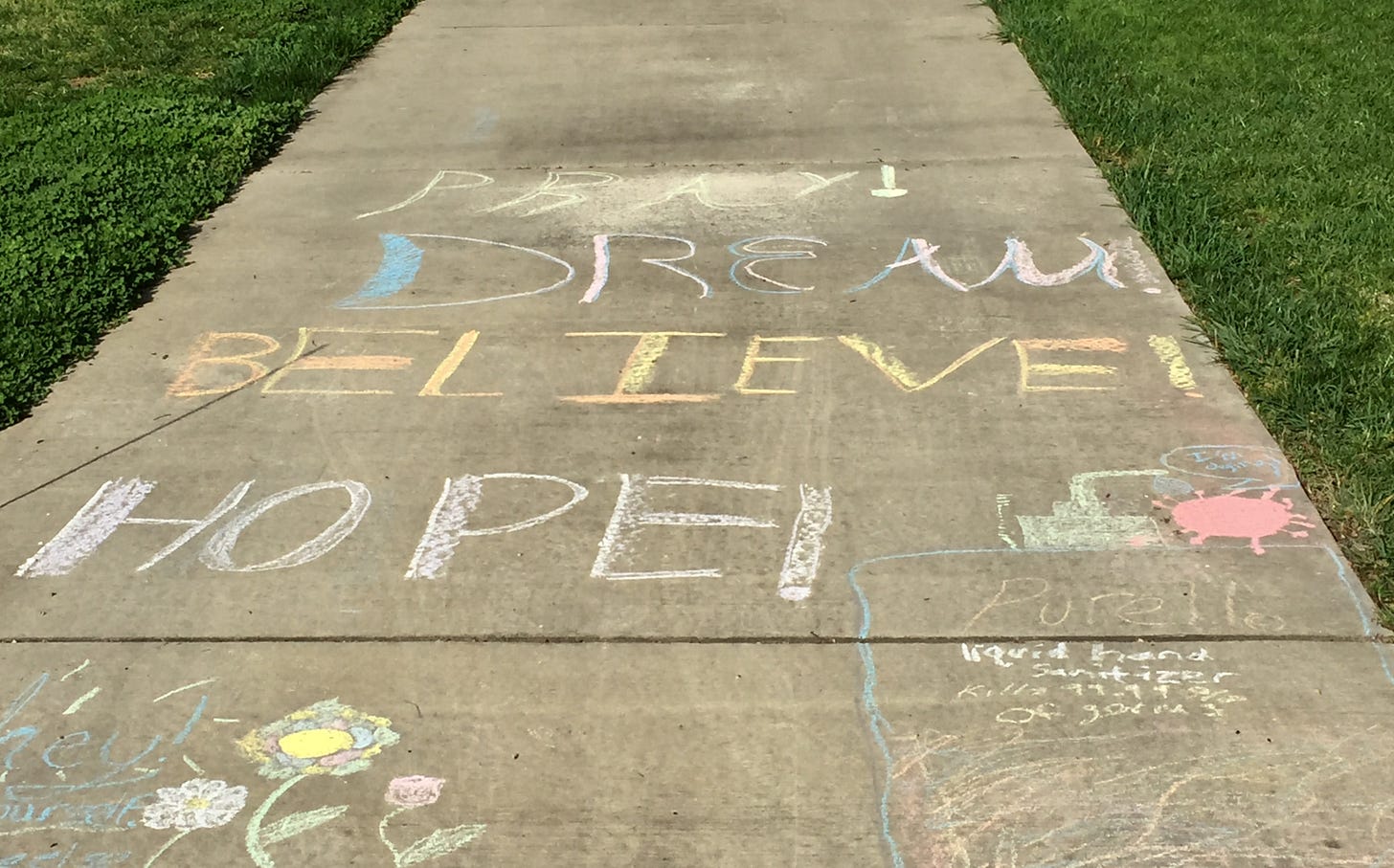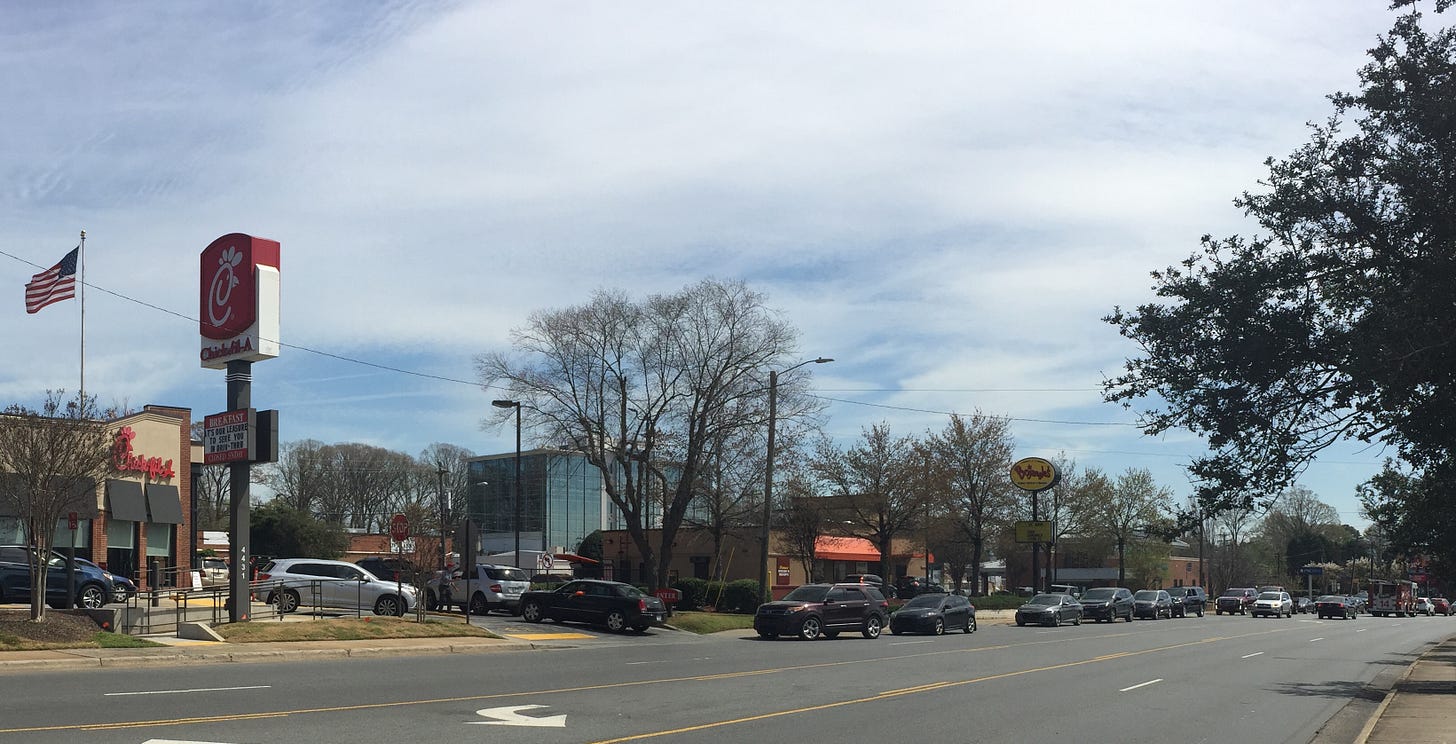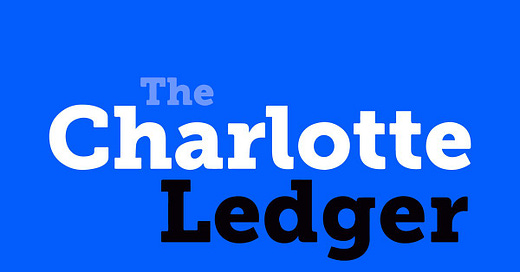Just stay away from people
Plus: Charlotte neighborhoods organize scavenger hunts; Christian radio station signing off; Singer takes her shot at COVID-19 'Hamilton' parody
Today is Saturday, March 21, 2020. You’re reading The Charlotte Ledger, an e-newsletter with local business-y news and insights for Charlotte, N.C.
If you like what you see, please forward to a friend.
Need to subscribe? Sign up for free here (charlotteledger.substack.com). A paid subscription, starting at $9/month, gives you access to all articles and helps build smarter original, local news in Charlotte. Details here.
Social distancing might feel like an overreaction in Charlotte now. But it’s necessary, local health experts say
By Karen Garloch
March Madness has been cancelled. Schools are closed. Restaurants and bars offer carryout and delivery only. Libraries and YMCA branches are shut down.
One after another, places we go for work, learning and entertainment have been shuttered as we’re advised by public health officials to stay home and avoid groups of more than 10 to prevent the spread of the novel coronavirus, COVID-19.
We’re being told we should follow these “social distancing” guidelines to protect our own health and spare our communities the devastation we’ve seen in China and Italy.
In Mecklenburg County, the number of confirmed infections doubled this week, but like some other parts of the United States, we still haven’t seen large numbers of deaths or people sick with COVID-19 symptoms. (North Carolina had 137 confirmed cases as of Friday.) It’s not surprising that some healthy people feel justified in asking, “Are we overreacting?”
Flattening the curve
I put that question to two epidemiologists this week, and both responded with a resounding “No.”
“Our only weapon is social distancing, which is to keep people away from one another to the extent possible,” said Dr. Jeffrey Engel, executive director of the Council on State and Territorial Epidemiologists and former North Carolina state health director. “We have no medical interventions.”
The goal now is to “flatten the curve,” meaning to spread out inevitable infections so that the huge numbers of people experts say will be infected and become ill don’t overwhelm doctors’ offices and hospitals. That will ensure the seriously ill get treatment they need.
“The cat’s out of the bag,” said Dr. Katie Passaretti, medical director for infection prevention at Atrium Health in Charlotte. “We’re going to see an increasing number of cases.”
By social distancing, Passaretti said, “You’re avoiding illness yourself (and) making sure the health care system … can keep up and still provide excellent care.”
Current advice to stay home unless you absolutely must go out is “on the extreme end of social distancing,” Passaretti said.
“But we’re in a situation we haven’t really seen in our lifetimes,” she said. “There are benefits to being more aggressive (with containment measures) on the early side to mitigate the impact later on down the road.”
Silent spread
Health experts believe the new coronavirus had been circulating in this country for weeks before the first case was identified in Seattle in January. Because the United States was slow to roll out laboratory tests to identify people with infections, we don’t yet know the extent of infections.
Most people who contract the virus don’t even get sick, and most people who develop the disease have relatively mild symptoms. But COVID-19 can be deadly, especially for older people and those with underlying health problems.
Initially, health officials thought the virus was spread mainly by people who have symptoms, such as fever, cough or difficulty breathing. But recent studies have shown that people without symptoms are causing substantial amounts of spread as well.
Young people need to help. That’s why officials are making a particular effort to engage healthy young people who may be ignoring calls for social distancing and could be spreading the virus unwittingly.
With campuses closed, many college students took the opportunity to take a beach vacation this week with seemingly little regard for social distancing. On Friday, some South Carolina towns said they would step up police patrols on the beaches to deter crowds.
After a pre-St. Patrick’s Day weekend that saw crowds gathering in bars in many cities across the country (and launched hundreds of inter-generational Twitter rants), the White House advised all Americans to avoid groups of 10 or more.
“It’s never going to be perfect,” Passaretti said. “You could reduce your group size down to five and you could still be with someone who’s sick. But if I’m only with a small group, I can’t infect as many people.”
Past pandemics
The Spanish flu of 1918 was different from COVID-19 in many ways, but actions during that outbreak demonstrated the ability to slow the spread of a virus by practicing what is now called social distancing.
In the midst of World War I, Philadelphia allowed a Liberty Loan parade to raise money for the war effort to proceed; within three days, the city’s hospitals were overflowing, with thousands dead. By contrast, St. Louis authorities closed their city down — schools, playgrounds, libraries and churches — and banned large gatherings. In the end, the per-capita death rate in St. Louis was half that of Philadelphia.
In recent decades, Engel and other public health officials have battled major outbreaks of new viruses — SARS in 2003, swine flu in 2009, MERS in 2012 — but none demanded the stringent containment measures we’re seeing today.
Why the difference?. SARS and MERS were deadlier than COVID-19 but much harder to spread. That allowed more time for containment measures to work.
H1N1 swine flu was a new virus that spread easily, but many people had some immunity because they had been exposed to previous swine flu strains. “It was a mild pandemic, no different from a bad flu season,” Engel said. Also, within six months, the next seasonal flu vaccine included protection against H1N1.
Deadlier than flu, cousin to the common cold
Distinct from flu, COVID-19 is in the family of coronaviruses that cause the common cold. “There has never been a human vaccine for coronavirus,” Engel said.
Also, the new coronavirus is predicted to be as much as 10 times deadlier than the seasonal flu, which causes death in about 0.1 percent of cases.
Early reports showed the death rate for COVID-19 at 3% or higher. But that’s when testing was limited and most people who got the test were seriously ill or at least had symptoms. As testing expands and officials get a more accurate count of total infections, the rate is expected to drop.
“My guess is it’s going to be about 1%, one of 100 people infected will die,” Engel said.
“I think we’re in the first wave,” he said. “Whether or not there’s going to be another wave, I don’t know. The virus appears to be very well adapted to humans.”
Months of effort ahead
By the time a coronavirus vaccine is available next year, Engel predicted, “perhaps 50% of the nation will already have been infected. And then we’re going to learn if people can get re-infected because of subtle mutations. Perhaps in two years, it becomes another virus that causes the common cold.”
Until then, how long do we need to stay home and away from other people?
No one knows. It could be months.
Both Passaretti and Engel recommend taking control of what you can:
Wash your hands frequently, and avoid touching your face. Stay home if you can. If you must go out for groceries or work, stay at least six feet away from others. If you touch a surface that might be contaminated, wash your hands again. If you think you might have been exposed, self-quarantine for 14 days. If you’re showing symptoms, call your doctor — don’t go to the office — and ask to be tested.
Karen Garloch spent 45 years as a newspaper reporter in Ohio and North Carolina. She is now enjoying retirement after covering health and medicine for the Charlotte Observer from 1987 to 2017. She can be reached at kgarloch1951@gmail.com.
Neighborhoods work to alleviate boredom
Neighborhoods across the Charlotte region have been devising creative ways to keep kids entertained as most people now are home-bound.
They’re organizing visual scavenger hunts, putting up Christmas lights or other decorations, writing chalk messages on driveways and even holding socially distant outdoor happy hours (for the parents).

“It makes it so much more fun to walk if you’re hunting for things,” said Samantha Louis-Jacques, who lives in Tega Cay’s Lake Ridge subdivision. “It also lets the kids know that we are all supporting each other and are in this together.”
She organized a scavenger hunt with a list of more than 90 items, including a pineapple plaque, a garden gnome and a snowman flag.
Today’s supporting sponsors are Industrial Handling Solutions…

and T.R. Lawing Realty:

Christian radio station signing off
Longtime Christian radio station WHVN is going silent at the end of the month, as a developer has agreed to buy the land off Randolph Road that contains its transmitter.
The station has had a Christian format since 1971. Its website says it was Charlotte’s first Christian radio station, and general manager Tom Gentry tells The Ledger it traces its roots to 1951. It has bounced around to several places on the dial with different call letters over the years but is now heard on 1240 AM and 104.3 FM.
When Gentry started in radio at age 20, it was known as WIST: “It was the #1 rock station in Charlotte. It was the rock station in the city of Charlotte.”
He said a number of well-known local radio personalities passed through. Today, its lineup includes local pastors. The station’s longtime owner, George H. Buck Jr., died six years ago, and everybody knew WHVN’s time was running short. Gentry is 77.
He said he doesn’t know plans for the transmitter site, which is in Grier Heights across from Mint Museum Randolph. In the last few years, new medical buildings have popped up in the area.
“There is something very, very sad about it for me,” he said. “It’s part of my life.”
The Ledger is providing expanded coverage of the coronavirus crisis thanks to sponsors and paying subscribers, who receive every issue. Be a part of building smarter local news for Charlotte. Details here.
Signs of normalcy in Cotswold…

Like old times: Cars back up onto Randolph Road while waiting for the Chick-fil-A drive-thru at lunchtime.
… and signs of weird times in Cotswold

Liquor line: A line 20-people deep, socially distanced, forms outside of the ABC Store. A police officer takes orders at the door and only one person at a time is allowed inside to pay.
Not the first time Burr has cashed out during an economic crisis
By now you’ve probably read the story about Sen. Richard Burr, who unloaded up to $1.7M in stock after receiving private intelligence briefings about the coronavirus last month. Publicly, he was assuring us that the U.S. was prepared.
A Ledger reader points out that at the start of the last financial crisis, in 2008, Burr also made sure he had plenty of cash. From a 2009 story from The Hill:
Sen. Richard Burr (R-N.C.) says when the financial crisis began he encouraged his wife to withdraw all the cash she possibly could from their local bank.
During a speech on the economy last night, Burr related his immediate reaction the week the crisis began. After hearing Treasury Secretary Hank Paulson relay a story about a major company having trouble transferring money between banks, Burr became worried about the solvency of his own bank.“On Friday night, I called my wife and I said, ‘Brooke, I am not coming home this weekend. I will call you on Monday. Tonight, I want you to go to the ATM machine, and I want you to draw out everything it will let you take,’” Burr said, according to the Hendersonville Times-News. “‘And I want you to tomorrow, and I want you to go Sunday.’ I was convinced on Friday night that if you put a plastic card in an ATM machine the last thing you were going to get was cash.”
In brief
On hold: Ten Tryon, a mixed-use development planned for North Tryon Street between 9th and 10th streets uptown, has been shelved “until economic conditions stabilize,” the developer said Friday. It was to be a 15-story tower with a Publix.
Incoming economic data to be ‘unprecedented’: Wells Fargo economists said in a research note Friday that the coronavirus situation is an “unprecedented interruption and reorganization of economic life.” They said it’s too soon to know how bad the data will be and that policymakers still have tools available to combat the crisis. Prediction: “The incoming data will be unprecedented. Jobless claims will be in the millions next week.” (Wells Fargo)
Evictions paused: “Mecklenburg Sheriff Garry McFadden said Friday his office will stop eviction removals for one month, thanks to a court order from the state’s chief justice.” (Observer)
Stranded in Ecuador: “Charlotte travelers stuck in Galapagos Islands, can’t find flight to U.S. amid coronavirus pandemic” (WBTV)
Worthy read: “Alcoholics Anonymous Members Face Challenges As Coronavirus Halts Meetings” (WFAE)
Seeking help: “If We Shelter In Place, How Will Domestic Violence Victims Stay Safe?” (WFAE, with list of resources)
Bank assistance, part 1: Truist says it is helping customers by allowing them to postpone payments on credit card bills and loans, waiving ATM surcharge fees and providing 5% cash back on credit card purchases at grocery stores and pharmacies.
Bank assistance, part 2: Wells Fargo says it is “suspending residential property foreclosure sales, evictions and involuntary automobile repossessions” and “offering fee waivers, payment deferrals and other expanded assistance for credit card, auto, mortgage, small business and personal lending customers who contact the company.”
How you can help
List of restaurants offering delivery or pick-up (CharlotteFive)
And another list of restaurants (Piedmont Culinary Guild)
Give a virtual tip to a server (Agenda)
List of charities needing assistance (Observer)
Local businesses offering discounts (Support Local Or Else)
Loves me some internet
Our good friends over at The Biscuit (Charlotte Is Creative) pass along this amazing bit of creativity from an actress and singer with Charlotte ties.
What would happen if the title song from “Hamilton” were reworked to be about COVID-19? Here’s your answer:
That’s Janeta Jackson. The Biscuit says she is “well known in Charlotte for her portrayal of Mary Poppins at Children’s Theatre of Charlotte and this winter’s performance as Billie Holiday for Actor’s Theatre of Charlotte. Take a minute to watch and giggle. Trust us, you’ll be humming this all day.”
Credible, independent local news is more important than ever:
Got a news tip? Think we missed something? Drop me a line at editor@cltledger.com and let me know.
Like what we are doing? Feel free to forward this along and to tell a friend.
Archives available at https://charlotteledger.substack.com/archive.
On Twitter: @cltledger
Sponsorship information: email editor@cltledger.com.
The Charlotte Ledger is an e-newsletter and web site publishing timely, informative, and interesting local business news and analysis Mondays, Wednesdays, Fridays and Saturdays, except holidays and as noted. We strive for fairness and accuracy and will correct all known errors. The content reflects the independent editorial judgment of The Charlotte Ledger. Any advertising, paid marketing, or sponsored content will be clearly labeled.
Editor: Tony Mecia; Contributing editor: Tim Whitmire


